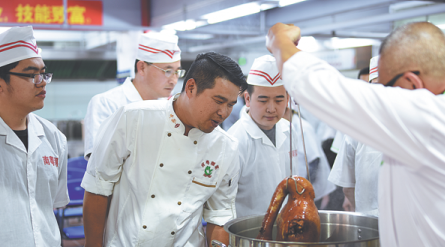Cantonese cooking serves up success
Chen Guanzhong struggled for two years running a restaurant in his hometown of Zhengguo, before he took part in a special Cantonese cuisine training program.
Chen returned to his hometown in Zengcheng district of Guangzhou, in 2016 to set up a business selling wonton and laifen, a type of thick rice noodles.
For a couple of tough years, Chen struggled to keep the business afloat, until he honed his skills in the training program that has benefited many chefs in Guangdong province.
According to local officials, the training promotes Cantonese cuisine culture and the culinary industry while offering people jobs and helping with rural revitalization.
"I have attended more than 50 courses," Chen said, adding that under the guidance of a group of Cantonese cuisine masters, his wonton and laifen recipes and preparations have been given a new lease of life. His small restaurant now serves as many as 600 customers in a single day.

A chef lifts a marinated goose out to show to his peers in Shantou, Guangdong province. CHINA DAILY
He took other training courses in the program to further develop his skills in making specialties such as chili sauce, fried wonton and chicken feet in vinegar sauce. "The program gives us a platform and a team. The support from the government generates a cohesive force among people in the catering industry, which encourages us to break free from limitations we may have," Chen said.
In April last year, he applied for and obtained a special entrepreneurship loan of 500,000 yuan ($79,210) offered by the training program. He used the money to rent bigger space for the restaurant and hire more than 10 employees.
"The biggest benefit of the Cantonese cuisine training program is that young people can return to their hometowns and start a business to take forward Cantonese cuisine," Chen added.
According to the government, the positive role the program plays is not only on the consumer side but also in the supply chain, as it integrates green agriculture, e-commerce and logistics and connects restaurants and producers.
As of last October, thanks to the program, some 609,600 people found jobs or started businesses of their own.



 Print
Print Mail
Mail

